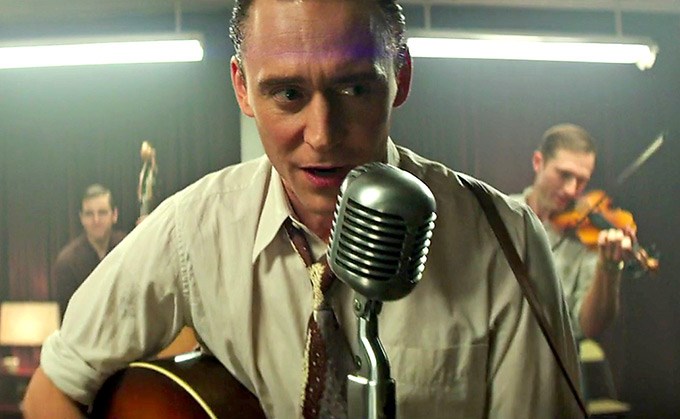I Saw The Light, Marc Abraham’s biopic about legendary country crooner Hank Williams, does much to re-create the rigorous schedules that defined the post-Depression country music scene but little to delve into the demons that chased Williams into an early grave at age 29.
Whatever shortcomings plague the film, they are not due to Tom Hiddleston. Never mind the criticism that a Brit shouldn’t be playing America’s first bona-fide country superstar: Hiddleston, known best to U.S. audiences as Loki in The Avengers franchise, does an outstanding job with both the accent and with Hank’s trademark yodeling twang.
But we never get to the root of his boozing, his womanizing largely takes place offscreen, and his song-writing process is ignored altogether. What’s left is a somewhat soulless character study of the man known as the Hillbilly Shakespeare.
The film opens with a prettily lit but out-of-context dream scene of Hank playing “Cold Cold Heart” and black and white monologues from his manager Fred Rose (Bradley Whitford), which serve as periodic narration. Â
The story takes flight on a rainy night at an Alabama gas station, where Williams marries newly divorced Audrey (Elizabeth Olsen, great here) against the will of his controlling mama Lillie (Cherry Jones). “I haven’t been driving you all over the state for 10 years to let her swoop in,” barks Lillie, who fights with Audrey over the money from Hank’s gigs.
Audrey doesn’t just want the cash, she wants the glory, but proves to be a middling talent. Hank’s insistence that Audrey sing rankles his band (the Drifting Cowboys) and his handlers. “At least turn her mic down for God’s sake,” says one radio boss.
Hank’s local success means nothing: he wants Nashville’s Grand Ole Opry, the holy grail of country music. Hit records, marital discord and several stints in detox follow, until on June 11, 1949, Hank gets his wish of appearing at the Opry. Audrey’s dream, meanwhile, is sidelined by newborn Hank Williams Jr (who would go on to his own fame in the music business).
Thanks to a spinal condition (diagnosed finally as spina bifida) and surgery, Hank’s addiction to pain meds and cocaine in snuff bullets worsens. By the time “Your Cheatin’ Heart” is released, Hank is under a doctor’s care and on “circus animal” tranquilizers. Add that to the drinking and spending some 100 out of 119 days on the road, and Hank’s early death doesn’t come that much as a surprise.
Hank Williams: The Biography serves as the basis of the film, written and directed by Abraham. His film teases us with interesting facts and asides that are left unexplored, such as the real reason his father was committed to a VA hospital when Hank was six, or more info about Hank’s alter ego, Luke the Drifter. The scene where Hank more or less screws a movie deal because he won’t take off his hat is one of the most interesting of the film.
“Everybody has a little darkness in them,” Hank tells a reporter, tellingly. More darkness and less bland vanilla would’ve made the biopic about  the man who defined 20th century country music and hit Billboard’s Country top 10 35 times, far more watchable.
I Saw The Light opens Friday at Fifth Avenue.



